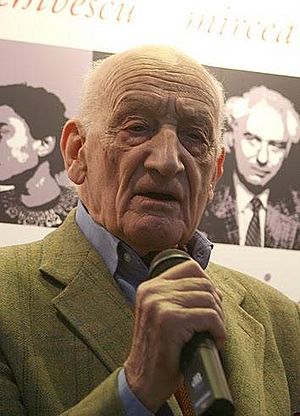Neagu Djuvara facts for kids
Quick facts for kids
Neagu Djuvara
|
|
|---|---|

Djuvara in November 2008
|
|
| Born | Marcel Djuvara-Neagu-Bunea August 18, 1916 Bucharest, Kingdom of Romania |
| Died | January 25, 2018 (aged 101) Bucharest, Romania |
| Resting place | Bellu Cemetery, Bucharest |
| Occupation |
|
| Language | Romanian |
| Alma mater | University of Paris |
| Notable awards | Prix Broquette-Gonin Order of the Star of Romania |
Neagu Bunea Djuvara (born August 18, 1916 – died January 25, 2018) was a famous Romanian historian, writer, and diplomat. He was known for his interesting ideas about history and his very long life.
Contents
A Long and Interesting Life
Growing Up in a Changing World
Neagu Djuvara was born in Bucharest, Romania. His family was from a noble Aromanian background. His father, Marcel, was an engineer and a captain in the army. Sadly, his father died in 1918 from the Spanish flu.
His mother, Tinca, came from an old noble family called Grădișteanu. Neagu Djuvara was born during World War I. As a baby, his family had to move to Iași to escape the war. They even traveled through Russia to Belgium.
He went to school in Nice, France. He studied Literature and Law at the University of Paris. His law thesis was about unfair laws in Romania.
During World War II, he returned to Romania. He joined the Romanian Armed Forces. He fought on the Eastern Front and was wounded in the arm. After this, he decided to work as a diplomat.
Becoming a Diplomat
Djuvara joined the diplomatic service. He was sent to Sweden as a special messenger. This happened on August 23, 1944. On that day, Romania changed sides in the war. It left the Axis Powers and joined the Allies.
His job was to ask the Soviet representative if peace terms were still valid. He was told not to tell the Western Allies about these talks. Djuvara later said that Romania was not ready to sign any peace deals at that time.
After the war, new communist officials took over in Romania. Djuvara was removed from his diplomatic job in 1947.
Life in Exile
Because of political changes in Romania, Djuvara decided to stay abroad. He moved to Paris. He worked with other Romanians who were also living in exile. They tried to support anti-communist causes.
He worked for a magazine called Casa Românească. In 1961, he moved to Niger in Africa. He worked there as an adviser for the country's Foreign Ministry. He also taught International Law and Economic History at the University of Niamey.
While in Paris, he continued his studies. He earned a special doctorate in the Philosophy of history. He also got a diploma in Philology.
After 1984, he returned to Europe. He kept working with Romanian cultural groups in exile. He also contributed to Radio Free Europe. He lived between Paris and Munich.
Return to Romania
Djuvara came back to Romania after the Romanian Revolution in 1989. From 1991 to 1998, he taught at the University of Bucharest. He often spoke out about political events in Romania.
He joined the National Liberal Party. He was worried that Romania was not changing fast enough after joining the European Union. He also believed that old secret police forces still had power.
In August 2016, Neagu Djuvara turned 100 years old! He was honored with the Order of the Star of Romania. His last public appearance was in December 2017. He died from pneumonia in Bucharest on January 25, 2018, at 101 years old. He was buried in Bellu Cemetery.
He is remembered by his daughter, granddaughters, and great-granddaughters. Many of his books were published by Humanitas.
His Work as a Historian
Most of Neagu Djuvara's work was about the history of Romania and the Romanian people. He also wrote about the Philosophy of history, questioning if history can ever be completely "truthful."
Exploring Romanian History
Djuvara believed that there was still much to learn about Romanian history. Some people thought his ideas challenged Romanian national identity. This was because he questioned how accurate some historical research was.
He also suggested interesting theories about the origin of the Romanians. For example, he thought that many nobles in medieval Romanian states were of Cuman origin.
Romania and Europe
He wrote a lot about Romania's relationship with Europe. He described Romania as being "between East and West." He called it the "last to enter what is commonly called the European concert." This referred to Romania's shift towards a Western way of life.
He also talked about multiculturalism in Europe. He felt it could cause problems for stability within the European Union.
Djuvara also criticized what he saw as too much focus on Western culture in Romanian politics. He argued that Romanian society and culture were not fully Western. He pointed to the main religion, Orthodoxy, and many non-Latin words in the Romanian language. He also mentioned the country's history as reasons.
Making History Fun and Clear
Djuvara was known for making history easier to understand. He wrote books for younger readers. He also tried to explain the real history behind famous figures like Dracula or Negru Vodă.
He also wrote about his time in exile. These books shared his experiences living and working in Paris and Niamey, Niger.
 | Bessie Coleman |
 | Spann Watson |
 | Jill E. Brown |
 | Sherman W. White |

